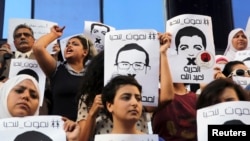The controversy over media freedom in Egypt intensified this month after several hundred Egyptian journalists rejected a declaration by newspaper editors pledging support to the government and banning criticism of the police, judiciary and army in their reports.
The crackdown on freedom of expression in Egypt has increased since the military coup in 2013 and has included the detention of journalists – like the imprisonment of three Al Jazeera English staff – and on-going efforts by the government to stifle critics.
"The current government has gone to a further extent in limiting press freedom," said Stephen McInerney, executive director of the Program for Middle East Democracy. "Countless incidents of intimidations and direct threats to journalists and their sources, censorship of articles and removing print copies of newspapers from circulation," he added.
A top human rights delegation met recently at United Nations offices in Geneva and raised deep concern over alleged violations by the Egyptian government of freedoms of speech, press and assembly.
"The U.S. along with many other countries made statements in Geneva that were very critical of the human rights situation in Egypt including the freedom of expression which the U.S. pointed out particularly," said Michele Dunne, a senior fellow at the Carnegie Endowment for International Peace.
Free speech in a 'new Egypt'
Speaking to the annual United Nations General Assembly in September, Egyptian President Abdel Fattah el-Sissi pledged his "new Egypt" would guarantee the freedom of speech.
Sherif Mansour, Middle East program coordinator for the Committee to Protect Journalists, notes the president’s remarks came shortly after more journalists in Egypt were taken into custody.
"A number of journalists were detained and eleven of them are still in jail because they were reporting sensitive events or were critical of the government," Mansour said.
Mansour said Sissi’s promise to maintain freedom of expression was not sincere.
"This is a double-faced policy trying to appease the international community, arguing that Egypt is on track for democracy and justifying restrictive measures under an anti-terrorism banner," Mansour said.
Analyst Dunne said Sissi and his government are trying to rationalize the crackdown by saying the nation needs protection from the threat of terrorism and that any criticism of the government or the military is seen as aiding terrorism.
"President el-Sissi explicitly instructed journalists to refrain from agitating the public, saying that the media needs to preserve the integrity of the Egyptian state," Dunne said. She added, “Following that, the heads of major government and privately owned newspapers pledged to refrain from covering unrest or criticize state institutions."
Islamist militants have killed hundreds of police and security forces since Sissi came to power in 2013. Security concerns have recently grown more acute, with Sinai-based Ansar Beit al Maqdas, Egypt’s most active jihadi group, reportedly pledging allegiance to Islamic State.
But government efforts to control the media narrative have met resistance from many Egyptian journalists.
"Hundreds of journalists are joining together, speaking out against the editors’ pledge, refusing attempts to silence the independent and critical coverage of events in Egypt," Mansour said.
McInerney argued journalists need help in their fight. “I think it is crucial that the internal dissent be accompanied by consistent pressure from the international community,” he said.
U.S. Secretary of State John Kerry has urged Egypt to uphold press freedom. "I emphasized our strong support for upholding the universal rights and freedoms of all Egyptians including freedom of expression, peaceful assembly, and association," Kerry said.
McInerney said there is a need to back up U.S. statements with forceful actions.
“To maintain the U.S. aid to Egypt, Congress requires the administration to certify that the Egyptian government is taking steps to govern democratically,” McInerney said. “Such certification would be impossible as long as the crackdown on press freedom continues.”
Call for US action
So far, analysts say, the Obama administration has seemed reluctant to enter the fray.
“The U.S.-Egypt relationship is in desperate need of a serious transformation, and the administration’s next steps will define U.S. priorities in the long term,” McInerney said. “On the very few occasions that the United States has used aid to Egypt as leverage, it has been effective.”
Dunne said the Obama administration withheld part of the U.S. military aid to Egypt after the ouster of the country's first freely elected civilian President Mohamed Morsi but it is facing conflicting priorities.
Obama and Secretary of State Kerry have raised the issue of freedom of the press and human rights violations with the Egyptian government.” Dunne said "But at the same time the U.S. is trying to build an Arab coalition against ISIL and wants Egypt to participate."
Egypt is also a key partner for the U.S. in the Middle East on a range of issues, from support of Israel, other counter-terrorism efforts and military and intelligence cooperation.
Dunne said the U.S. is willing to be forthright in its criticism of curbs to freedom of expression in Egypt but it is not clear whether the administration would actually match that with real pressure.
Earlier this year, Dunne who co-chairs The Working Group on Egypt, signed with the group an open letter to President Barack Obama with specific recommendations.
"The United States cannot control what happens in Egypt, but a consistent U.S. stand for democracy and human rights can influence the political trajectory of this important U.S. ally," the letter said. "Such a strategy will be far more successful over time than subsidizing a brutal crackdown and putting U.S. credibility behind a political arrangement that works against U.S. interests as well as those of Egyptian citizens."




